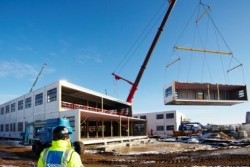A government-led initiative has the potential to revolutionise the construction industry, argues Hannah Vickers.
Following last year's budget, the chancellor announced that the government would "adopt a presumption in favour of offsite construction". While a minor footnote in the announcement, it has huge repercussions for the future of our industry and how we work.
Viewed at its best, this announcement is about leveraging the government's significant buying power to support the modernisation of the construction sector and an investment in high-quality design and increased performance. On the other hand, it could increase the "race to the bottom" mentality.
It will take careful engagement and collaboration to ensure the correct outcome and it's vital we get this right, especially in light of Dame Judith Hackitt's recommendations. However, before this can become a reality, the government needs to address the elephant in the room. Are they, and the industry, really ready to work in this way?
ACE is advocating that clients implement a strategy based around "customer segmented design", similar to the car industry, where they identify the market they are aiming a design at - luxury 4x4s for wealthier individuals or practical cars for families. For buildings, this could mean segments for a specific customer base such as affordable social housing, care homes or schools. For major infrastructure, a similar approach could be taken, albeit these will be determined by defining segments around existing networks, such as footbridges for a single road, dual carriageway or motorway.
The impact of this approach could be further enhanced through making these solutions available on the open market on long-term agreements, aggregating demand across public sector clients and allowing the private sector access too. In response, we will see experts emerge from our industry with an innate understanding of specific needs, an incentive to continuously improve design and the opportunity to learn from performance.
We will need to adapt our mindset to deliver quality and user-experience instead of a pipeline of fully bespoke work, but the move to offsite and manufacturing processes presents an opportunity to seize and reinforce our value across the supply chain. There will also be positive impacts for skills as this new way of working is likely to be more attractive and rewarding. After all, most engineers are problem solvers and harnessing expertise in this way and with the digital tools now at our disposal, will unlock frustrated creativity.
Of course, there will be some major issues to deal as we transition to new business models. What will this mean for partners across the supply chain and how will they need to evolve? Will contractors be able to control production and develop logistical capabilities? What will lawyers and insurers make of our new approach? We will also need to develop transparent measurements of quality and performance - i.e. a "Trustpilot for consultants".
These are just some of the issues which remain, but there is no doubt in my mind where we are heading. Through our Future of Consultancy campaign, ACE will develop the collective vision from the industry, in parallel with continuous engagement with government, our partners and clients. We will also develop the new business models and capability within the industry to ensure all our members are able to benefit from the coming revolution in construction delivery.









